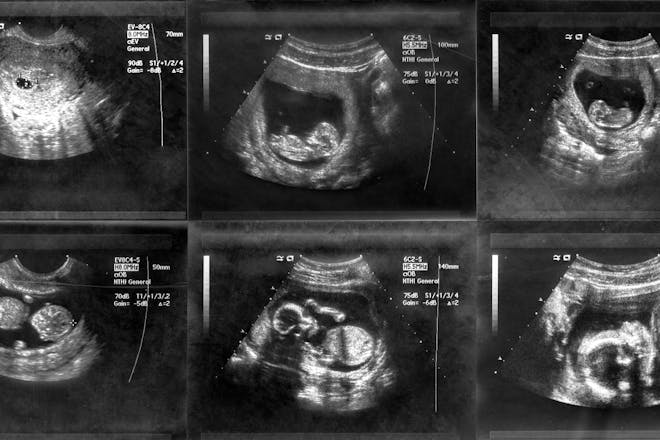Vaginal discharge during pregnancy: what's normal and what's not?
One symptom when you're expecting a baby is increased vaginal discharge. But what's normal and what's not? We take a look at some examples that may appear throughout your pregnancy.
We all know that discharge isn't pleasant. But when you're pregnant you'll actually be glad to see it. (Whaaaat?) That's because it has a very important purpose. Healthy vaginal discharge actually helps prevent infections travelling up your vagina towards the baby, according to the NHS.
Discharge during pregnancy also increases as you get closer to your due date.
FREE NEWBORN NAPPIES
What does normal pregnancy discharge look like?
The first thing to know is what healthy vaginal discharge looks like?
As a rule of thumb, the healthy kind:
- is clear or white and milky
- doesn't smell
- doesn't cause itching down there
Discharge that doesn't fit the above criteria could be signs of a yeast or vaginal infection. And anything that's pink or blood-tinged could (although not always) be a sign that something's wrong.
Alternatively, it could be implantation bleeding if you're very early on in your pregnancy or if you don't know yet if you are.

Of course, if you have any discharge that's unusual or concerning, ALWAYS get it checked out by your GP or midwife. They'll have seen it all before and it's never worth taking risks during pregnancy.
In the meantime, scroll through our gallery to see examples of normal and not-so-normal pregnancy discharge ... you're welcome!
1. White or clear discharge
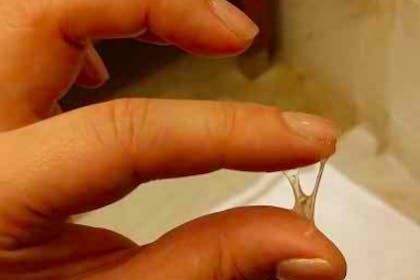
Early signs and symptoms of pregnancy can include experiencing more vaginal discharge than usual.
If it's milky, white or clear with no trace of blood or noticeable smell then it's perfectly normal.
According to the NHS:
'Healthy vaginal discharge is usually thin, clear or milky white, and should not smell unpleasant.'
2. Implantation bleed
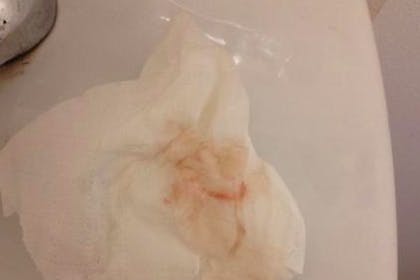
Early on in pregnancy (around the time your period would have been due), you may notice a pink-tinged or even blood-streaked discharge when you go to the loo.
This can be what's called an implantation bleed, which is thought to happen when the fertilised egg attaches to the lining of your womb, causing a slight bleed which is totally normal. Rarely, this can happen as late on as 8 weeks.
Implantation bleeding is often mistaken for a period, especially as you can experience implantation cramping that feel similar to menstrual pains, and it can look similar to your period too, ranging from 'spotting' to a light flow that lasts for a few days and may require a panty liner.
Find out what colour implantation bleeding is.
The best way to find out if the bleeding is related to implantation is to wait until your period is due and then take a home pregnancy test.
The results aren't always clear, but here we answer your questions about implantation bleeding and pregnancy tests.
It's always advisable to mention any bleeding during pregnancy to your doctor or midwife, especially if the bleeding is heavy or lasts more than a day or 2.
Sadly, vaginal bleeding in early pregnancy can sometimes be a sign of miscarriage, so it's always best to get it checked out.
But in most cases, a light bleed around the time your period is due is completely harmless, and a sign that all is well.
Find out more about bleeding during pregnancy.
3. Stretchy yellow discharge

Lots of Netmums in our Forum have said that they've noticed stretchy yellowy discharge early on in their pregnancy. Some say it looks more orange.
Although increased vaginal discharge can be one of the early signs and symptoms of pregnancy, if your discharge is yellowy in colour (as opposed to white) then it could be a sign of a vaginal infection.
Other symptoms might include itchiness, soreness, an unpleasant smell, or feeling pain when you pee.
Read our full article about yellow discharge during early and late pregnancy.
Make sure you see your GP or midwife as any coloured vaginal discharge other than white is not normal and could need treating ASAP.
4. Brown discharge
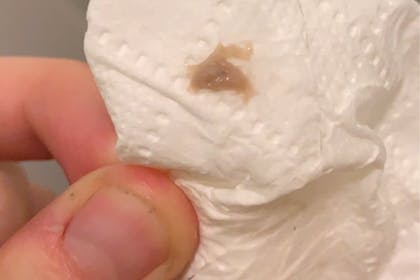
Many women in the Netmums Forum talk about experiencing brown discharge in early pregnancy.
Brown discharge is usually a sign that there's been some bleeding as brown blood is old blood (though you may not still be actively bleeding), so it's always best to get it checked out by a midwife or doctor as soon as possible.
If there are only a few spots of brown discharge, it may just be implantation bleeding, or harmless spotting. However, sadly, vaginal bleeding in early pregnancy can sometimes be a sign of miscarriage, so it's important to seek medical advice to be on the safe side.
5. LOTS of vaginal discharge

Lots of Netmums in our Forum are concerned about the amount of vaginal discharge in pregnancy. In other words, you've noticed lots of it since getting pregnant.
But according to the NHS, 'when you're pregnant, it's normal to have more discharge than before.'
Although increased vaginal discharge is nothing to worry about on its own, if there are any other symptoms that you're worried about, always get checked out.
6. No discharge

With all this talk of increased discharge, you may be a bit worried if you've had your positive test, but haven't noticed any changes to your vaginal discharge.
Well, don't be! Although it's common for women to experience increased discharge in early pregnancy, it doesn't happen to everyone.
Every woman and every pregnancy is unique, and a lack of discharge isn't necessarily a sign that something's wrong. You can mention it to your midwife at your next appointment to be on the safe side, but chances are you've just been lucky and managed to avoid this particular symptom.
7. Green-tinged discharge
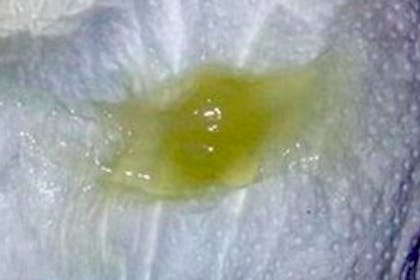
Non-white vaginal discharge could be the sign of a bacterial infection.
A green discharge could range in colour from yellow green to a brighter green. It can sometimes have an odour as well.
Action: If you notice green-tinged discharge, ALWAYS get it checked out by your GP or midwife. You may need antibiotics.
8. Like cottage cheese

Yep, it may sound horrible but if you start discovering discharge that reminds you of cottage cheese – thick, white and lumpy – it could be a yeast infection such as thrush.
Don't panic though – it's easily treatable. But do make sure you see your GP about it before treating it.
During pregnancy you'll need to treat it with topical medication rather than oral tablets.
9. Watery discharge
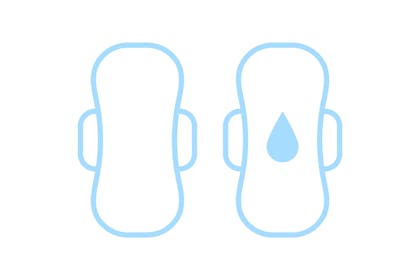
Some pregnant women in our Forum have described pregnancy discharge as 'watery'.
Here's what one Netmum has said:
'I'm 23 weeks but for the past several weeks I've been having watery discharge and not thought anything of it. It isn't constant and not usually a gushing sensation just wetness. It's clear and doesn't have a smell.'
The concern with particularly wet discharge is whether it's discharge or actually your amniotic fluid leaking. Amniotic fluid is usually clear, pale and watery, so it can be hard to tell the difference.
If you're in any doubt about whether your vaginal discharge is normal, wear a maternity pad and contact your midwife to see if it needs testing for amniotic fluid.
If the fluid is smelly or pink, seek medical advice straight away.
10. Pregnancy 'show'
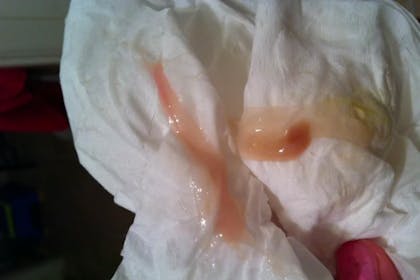
If you get a thick, jelly-like discharge towards your due date, this is most likely to be your 'show', otherwise known as the 'mucus plug'. It might be pink or bloody and can be a bit unpleasant to see when you go to the toilet.
Not everyone will notice theirs but the good news is that it's perfectly normal.
The NHS says it happens 'when the mucus that's been present in your cervix during pregnancy comes away.'
It's usually a sign that labour is not far away, so contact your midwife when you notice yours for further advice.
11. Vaginal pain and lots of discharge

One woman in our Netmums community mentioned in the Forum that she had 'vaginal pain + lots of discharge 14th week of pregnancy'.
It turned out to be nothing at all but if you do experience pain in conjunction with discharge, don't hesitate to get it checked out.
Your GP or midwife will be able to treat it (if needed) or at least ease any concerns if it does turn out to be nothing to worry about.
12. When to get help
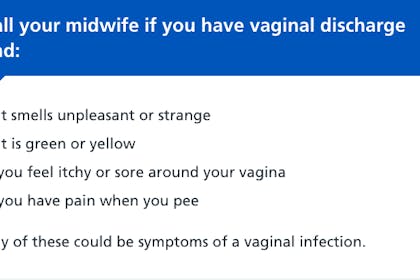
The NHS says to call your midwife (or GP) if you have vaginal discharge and:
- it smells unpleasant or strange
- is green or yellow
- has a cottage cheese texture
- you feel itchy or sore around your vagina
- you have pain when you pee
But don't hesitate to speak to your GP or midwife if you're at all concerned about your discharge.
And ALWAYS seek medical help if there's any vaginal bleeding during pregnancy.
13. How to deal with increased vaginal discharge in pregnancy

Even if you've had the all-clear and there are no health concerns, you might still find that the amount of discharge you're experiencing now that you're pregnant can be a bit uncomfortable. Unfortunately, there isn't much you can do to reduce the amount of discharge, but the following tips may make it easier to deal with:
- Maintain good hygiene: there's no need to wash inside your vagina, but be sure to keep your vulva (the outside bits) clean. As well as making you more comfortable, this can also help to reduce the risk of infection. It's best to use unscented soap or body wash while you're pregnant, as it's more gentle on your skin.
- Wear panty liners: these can help keep you feeling dry and fresh all day and avoid the need to change your underwear during the day in the event it gets damp. Use unscented panty liners. Scented feminine products can upset the delicate balance of natural bacteria and pH levels in that area, according to the Cleveland Clinic.
- Change your underwear more often: if you don't like the feeling of wearing panty liners, you can always just change your knickers a bit more often. Opt for 100% cotton.
- Wipe from front to back after using the loo: this is best practice at all times, as it also helps to reduce the risk of infection.
14. Other pregnancy symptoms you should never ignore
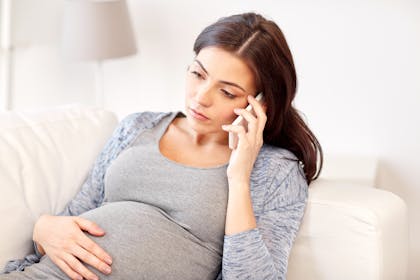
If you're still not sure whether your discharge is normal or not, it's best to talk to your midwife about it, to be on the safe side.
It's particularly important to seek medical advice as soon as possible if you're experiencing any of the following symptoms:
- abdominal pain or cramping
- a high temperature
- severe headache
- blurred vision
- fainting
- leaking clear fluid
- pain or redness in one calf
- a sudden change to your baby's movements
- extreme swelling
- pain when you pee
- extreme vomiting (not being able to keep down fluids)
- feeling very itchy all over your body
- before 37 weeks: regular and persistent contractions
These can all be signs of medical issues that need prompt attention, so see your GP or midwife as soon as you can, or call NHS 111 for advice.
Sources
- NHS. 2021. Vaginal discharge in pregnancy
- NHS. 2021. Vaginal bleeding
- NICE. 2019. Vaginal discharge - Clinical Knowledge Summary
- Tommy's. 21 February 2023. Bleeding in pregnancy
Got more questions about vaginal discharge? Find out more about your pregnancy symptoms in the articles below, or chat with other mums-to-be in the forum:

